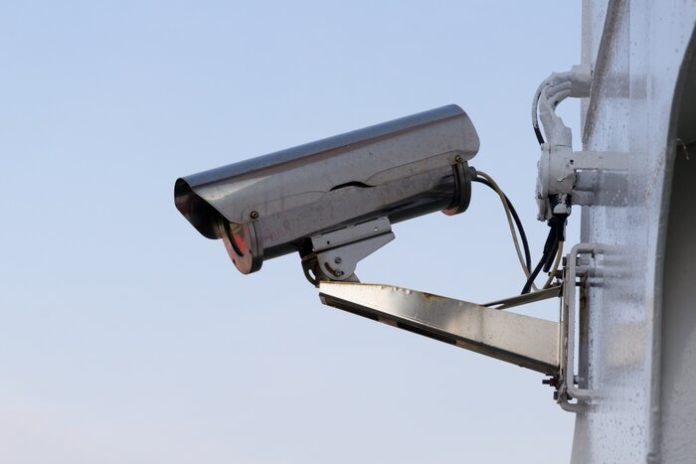Keeping your own life private can be difficult when security cameras are hidden on neighbors’ properties. It can feel intrusive to have cameras covering any part of your property, whether intentionally or not. We will show you different ways how to block neighbors security camera.
Though you can blind your neighbor’s security camera in many ways, only a few of them are legal and effective. Next, we will discuss how to blind your neighbor’s security camera effectively and practically. Then, we will discuss why you should never blind your neighbor’s security camera.
To learn more about protecting your life from your neighbors, keep reading.
Ask Your Neighbors to Move Their Cameras
Although this solution might be controversial, it would be the quickest and most cost-effective solution to your problem. You should avoid accusatory language when talking to your neighbor.
When you use an aggressive tone, you may make your neighbor feel attacked and compelled to defend their cameras. In some cases, the neighbor may refuse to move the cameras.
Instead, you can simply explain that the location of the security cameras makes you uncomfortable on your property. Providing your neighbor with a clear, respectful explanation of the situation will likely influence their vision. Even though a good relationship with their neighbors may not be the top priority for most people, they will hopefully be reasonable and understanding.
If your neighbor shows you what the camera is seeing, you can also gain peace of mind. However, they may be capturing only a small portion of your property.
Don’t forget to thank your neighbor if they move the cameras based on your request. Bring over something as a thank you. Showing that you were not accusing them of stalking can promote a positive and healthy relationship.
Is their camera real? Many homeowners install cheap imitation security cameras that look like the real thing. They will be a good deterrent against theft. You might discover whether they are real if you conduct research. Ask your neighbor if you have any doubts.
Fence Extensions
You can still protect your privacy even if the reason doesn’t resolve the issue. Installing barriers that block the line of sight of camera equipment is one of the easiest ways to prevent people from seeing your property. It is your property, and you control what people see on it. Installing fence extensions is one simple way to achieve this.
A fence extension is exactly what it sounds like; they are extensions that raise the height of your fence to prevent people from seeing over it. Depending on your neighbor’s camera angle, a foot or two of the extension might be sufficient to maintain your privacy.
In addition, fence extensions can obstruct the vision of pedestrians on the street. A fence extension is better for enhancing privacy than a regular fence.
There are many fence extensions, depending on the type of fence you have. By adding a trellis to your fence, you can extend its height. It is very easy to add a fence to a wood fence with just a hammer and a few nails. You can add a trellis of the same material to your fence if it is made of vinyl. Local hardware stores and fence companies sell trellis similar to these. You can even build them yourself if you have confidence in your construction skills.
Raising just a few panels could provide you with the privacy you want. If your fence height needs to be increased, you might not need to extend the whole perimeter.
Plant Trees and Other Barriers
In addition to fence extensions, you have other options that you can use to block the view of a camera. Adding thick trees around the perimeter of your property can be one of the most appealing options for homeowners. Your barrier can be made high enough for any camera, depending on the type of tree you get. Your backyard can also look more attractive with the trees.
Generally speaking, evergreen trees provide excellent vision-blocking abilities. These trees are available in a variety of sizes and shapes. Perhaps you should consider purchasing a larger tree. By purchasing a larger tree, you’ll enjoy full privacy right away.
In the same way as fence extensions, trees usually only need to be planted at a few places around your property, so using these barriers may be less expensive than you think. There are other options for blocking the view of a camera than trees and plants.
Many other things can be strategically positioned to block a camera’s view, such as sheds or basketball hoops. The cameras are not typically aimed at your house or backyard, so it is usually only necessary to block a small portion of the camera’s view.
Moving Objects
The other way to confuse a neighbor’s camera is to fill its view with moving objects. In most security cameras, the imaging is motion-activated, only activated when someone tries to break into the home. Nevertheless, the camera will also activate when you or your family members walk around.
Flags, or other moving objects, can solve this problem by being in the camera’s view. In some cases, the camera’s motion activation feature may not be able to distinguish between a flag and a person in the wind. As a consequence, hundreds of hours could be filmed with nothing happening.
The most likely outcome will be that your neighbor will have to turn off the motion sensor on their camera, which will prevent them from seeing as much of your activity. Although it isn’t a permanent fix, it is easier to implement than other alternatives.
Reflective Film
Reflective films are one of security cameras’ weaknesses. The film is ideal for keeping prying eyes and cameras out of your home’s interior. Like a one-way mirror, the reflective film will make the camera less able to see into your home when placed over windows.
The film is easy to install and does its job well. People passing by your windows will not be able to see through the reflective film, and cameras will be unable to take photos of you. One-way reflective films are easy to apply and don’t require glue.
Make sure all residue is removed before applying. Due to the darkness of night, this strategy will only be successful during the day as your windows will be transparent again at night, as most light will come from within the home instead of outside. At night, you’ll have to find another method of fooling the cameras.
Bright Lights (at Night)
The best defense at night is the use of bright lights. Your neighbors won’t be able to see anything on your property if you use a floodlight. It’s because security cameras see the light differently than you do. A security camera cannot focus beyond or around a floodlight if exposed to bright light. It may be possible to see your presence, but not your face and activities.
An LED flashlight can disable a security camera. Using floodlights outside your house will help you take advantage of this fact. Set them to turn on during the night and point them towards the offending cameras once they are installed. It will be easier for you to enjoy your privacy now that your neighbor’s cameras will not be able to see you.
A motion sensor light that only turns on when you’re outside would be a great choice. This will save you money since you don’t have to pay for bright lights all night long. Your outside activities won’t be monitored by intrusive security cameras, either.
Unfortunately, the lights won’t work the same way during the day. The sun’s light will temper any light you can shine, so everything except the light itself will be visible. The reflective film and lights will ensure that your house and property are protected from cameras.
Talk to the Police
You should always know where the law stands on issues like this when dealing with such a situation. You are protected from invasion of privacy where it is expected. Your neighbor may be violating privacy laws if they use cameras to spy on you from their house.
They are likely within the law if they can capture your front yard or other outdoor locations with their security cameras. However, laws vary from municipality to municipality, state to state, and country. Before doing anything, make sure you know what the laws are in your region. Consult an attorney knowledgeable about this subject if necessary.
If your neighbors place surveillance cameras in legal areas, they may only use the footage for legal purposes, such as home defense. If they insist on keeping video footage within a perimeter, you at least have the ability to make sure the footage is used only for security purposes when you speak with them. If your neighbors are breaking the law or not, the sight of cameras pointed at your home will still make you feel uncomfortable and anxious.
Most people highly value the freedom of privacy. You have still got many options to deal with the problem.
Talk to the Neighborhood Homeowners Association (HOA)
Depending on your local Homeowners Association rules, there might be a few things you can do to put pressure on your neighbors. Security cameras are allowed by most HOAs for security purposes. However, these groups exist to protect and enhance communities.
Your neighbor’s cameras invading your privacy might be removed (or at the very least angled away from your property) if you make a case to the Homeowners Association.
It is unlikely that your neighbors would listen to the Homeowners Association if they were not listening to your complaints. Individual homeowners are the only ones who decide whether to join these organizations.
The association can restrict access to certain neighborhood amenities (such as a neighborhood pool operated by the association), but they have limited authority over most things. If you are concerned about privacy, you should look for other options.
Things Not to Do
Although the cameras on your neighbor’s property are frustrating and invading, and even though their stubborn ways are irritating, you should not let this disagreement endanger your relationship. The rivalry between neighbors can escalate quickly and lead to long-term problems.
Keep your neighbor’s feelings in mind, and do your best to be polite and cordial. Don’t go across the line towards trespassing or causing property damage while protecting your privacy. It might be tempting to use a laser to damage the cameras of your neighbor. A camera lens can be permanently damaged by shining a powerful laser.
This would work for a short time, but they could always replace the camera, and the damage done to your neighbor’s property could be grounds for a lawsuit. Having to replace your neighbor’s camera – so he can start filming you again – is the last thing you need.
It is also prohibited to cut wires or inflict other damage to the security system. Such actions are illegal and could lead to serious consequences. You have the right to privacy while inside your home, but not in the park or on the street, since you cannot expect absolute privacy there.
Are you interested in learning about different security solutions you can employ for your safety? Check out the rest of Be-Safe’s resources today!

Daisy is the engine behind Be-Safe.org — from content production to product reviews and more. What drives her is the passion to make home security information easily available.





